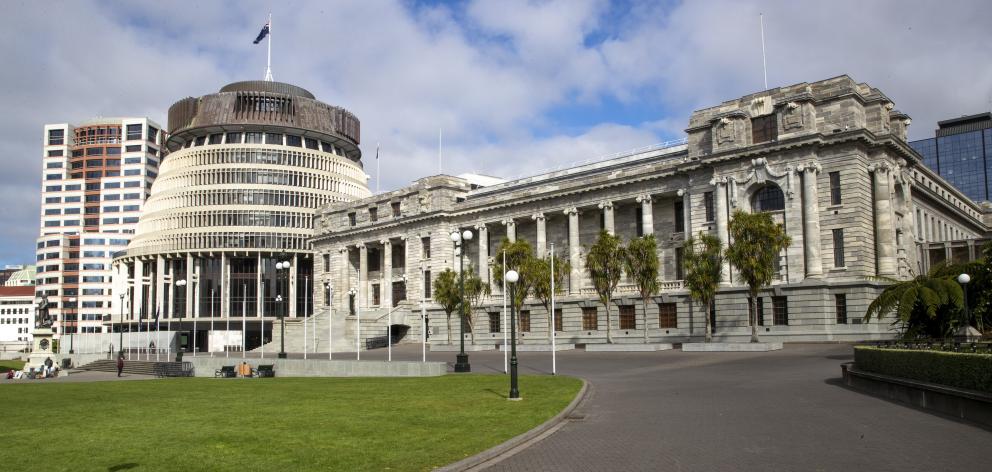
Even the Girl Guides Association (New Zealand Branch) Incorporation Amendment Bill which has sat around for almost four years going nowhere fast, is important to someone.
The House got a moving reminder of that on Wednesday when it came to the second reading of the Pae Ora (Healthy Futures) (Improving Mental Health Outcomes) Amendment Bill.

It was incredibly powerful watching it via live-stream; goodness knows how visceral, how impactful it was if one was sitting in the chamber.
And it was directly relevant to National Napier MP Katie Nimon’s Pae Ora Bill, which mandates that the Minister of Health must prepare and determine a mental health and wellbeing strategy.
"I just want to take this moment to speak a little bit out of what I was expecting to acknowledge," Ms Nimon said.
"Firstly, Suicide Prevention Day yesterday, and also Mark Cameron’s son Brody and Mark’s speech earlier today in the House, which I think was timely and poignant and very much related to this Bill."
A strategy, in and of itself, may or may not be of any use in tackling New Zealand’s shamefully high suicide rate, the pressure on mental health systems and the lengthy waiting list for addiction treatment services, but it being considered in the higher echelons of power can be no bad thing.
If passed — and given unanimous support at second reading it surely will be — the minister will have to assess the current state of, and the performance of the health sector in relation to mental health and addiction outcomes, assess the medium and long-term trends, and then set out priorities for improving outcomes.
Readers may recall that former Dunedin MP and one-time health minister David Clark began the work on what became the original Pae Ora Bill, and also that he commissioned an inquiry into mental health services as part of the Ardern government’s first hundred days commitments.
Given the importance of mental health and the focus Labour has placed on it, omitting a mental health strategy from the original legislation had seemed anomalous.
Taieri Labour MP Ingrid Leary — who began her speech by acknowledging the recent death of Labour activist Louise Gizzi — explained that it had been a deliberate decision, made from a desire to not clutter up the health strategy landscape with another document when it was felt that mental health cut across all areas of the health system.
Ms Leary, her party’s mental health spokeswoman, supported the Bill but challenged the government to come up with a mental health workforce plan.
"We know that the biggest challenge facing our mental health sector is workforce, yet I have yet to see a workforce plan," she said.
"Where is the workforce plan and where are the workers that are going to bring about the changes that the strategy will hopefully bring to the front line? ... We know that despite assurances from the government that there is no front-line freeze, that there are hiring freezes, certainly in my electorate in Taieri, in Southland, where advertisements for mental health nurses have disappeared."
Ms Leary closed with a challenge to the government to back up fine sounding words with action.
"When are we going to see funding? When are we going to see a workforce plan, and when are we going to see an end to the mental health crisis that so many of our rangatahi in particular are calling for?"
Dunedin Green list MP Francisco Hernandez was up next and despite speaking outside his portfolio responsibility areas gave a well-thought out speech calling for a bi-partisan approach to mental health.
"There are things that you might invest in that will take a long time to bear fruit. Sometimes you might want to invest in things that won’t obviously bear fruit for another couple of political cycles," he said.
"And it would be a terrible thing, I’m sure we would all agree, for long-term investments to get attacked on the basis that they’re not delivering immediate outcomes. I think when it comes to thinking about issues like this, we need to make sure that we are thinking of the long game."
He then pointed out that many strategies failed because there was no implementation plan behind them, a comment which got a hearty endorsement via interjection from Mental Health Minister Matt Doocey.
Mr Doocey then doubled down in his speech: "Francisco Hernandez, I think he nailed it very quickly. The last thing we want is another strategy. We got that after the last government’s mental health inquiry — 58 or so recommendations that sit on someone’s shelf somewhere ... what the sector is calling for [is] a clear plan, how we’re going to join up the services, and how we will implement and deploy them as well."
Mr Cameron, for one, will be hoping that is exactly what will come to pass.
Welcome back
Great excitement for the Opposition on Thursday when, in the absence of Disability Issues Minister Louise Upston, the previous minister answered question seven on her behalf.
The former minister was, as you may recall, Invercargill National MP Penny Simmonds, who had been given a right royal rucking by Labour during her months in charge.
Labour’s spokeswoman Priyanca Radhakrishnan resumed their old battle with glee, asking various questions about a funding freeze for residential care facilities.
Ms Simmonds, who may — or may not — been having quite as much fun, responded with variations on the theme of there was no such freeze.
"I absolutely know that it is the worst nightmare of every parent with a child with a disability to not be able to get services. But the important thing to remember is that services have not been cut. Services are being maintained," Ms Simmonds said.












